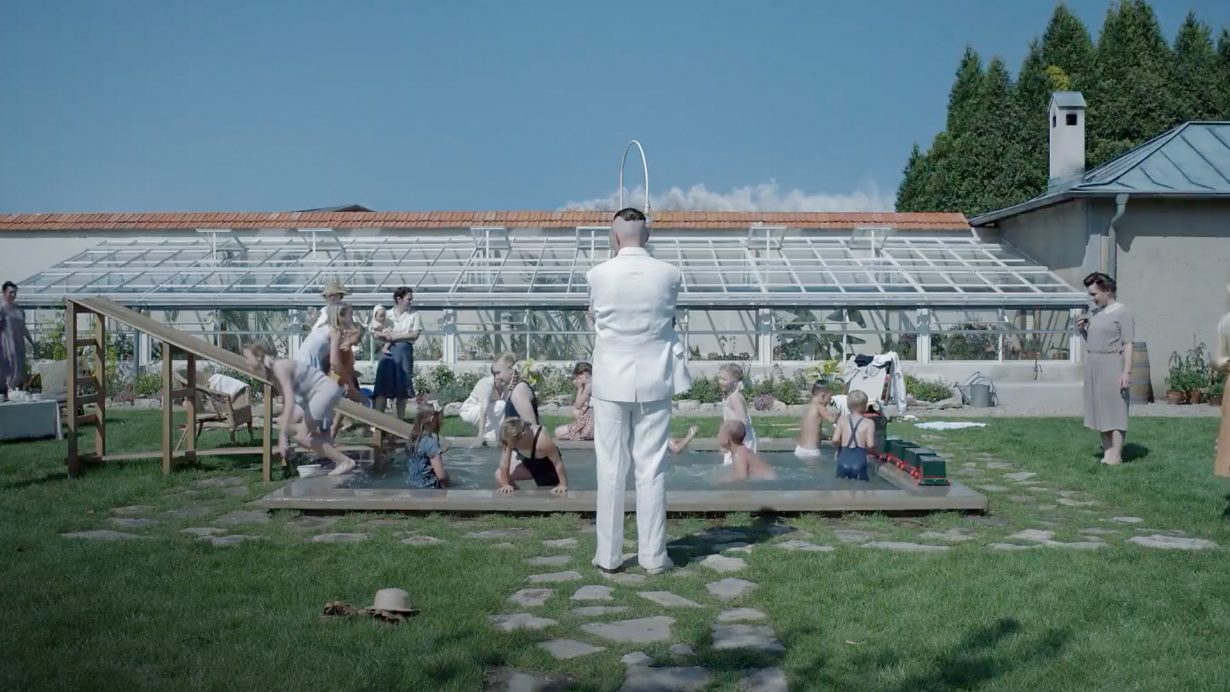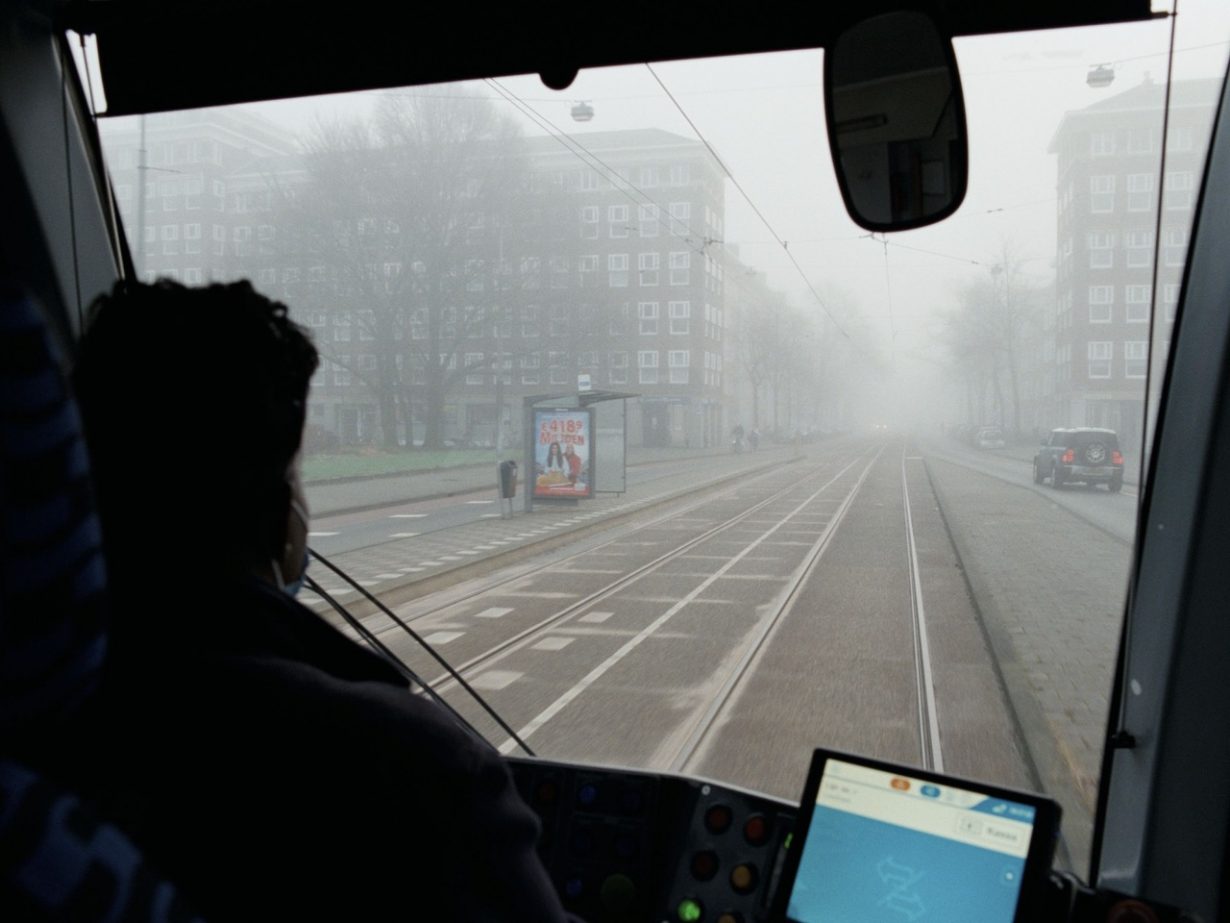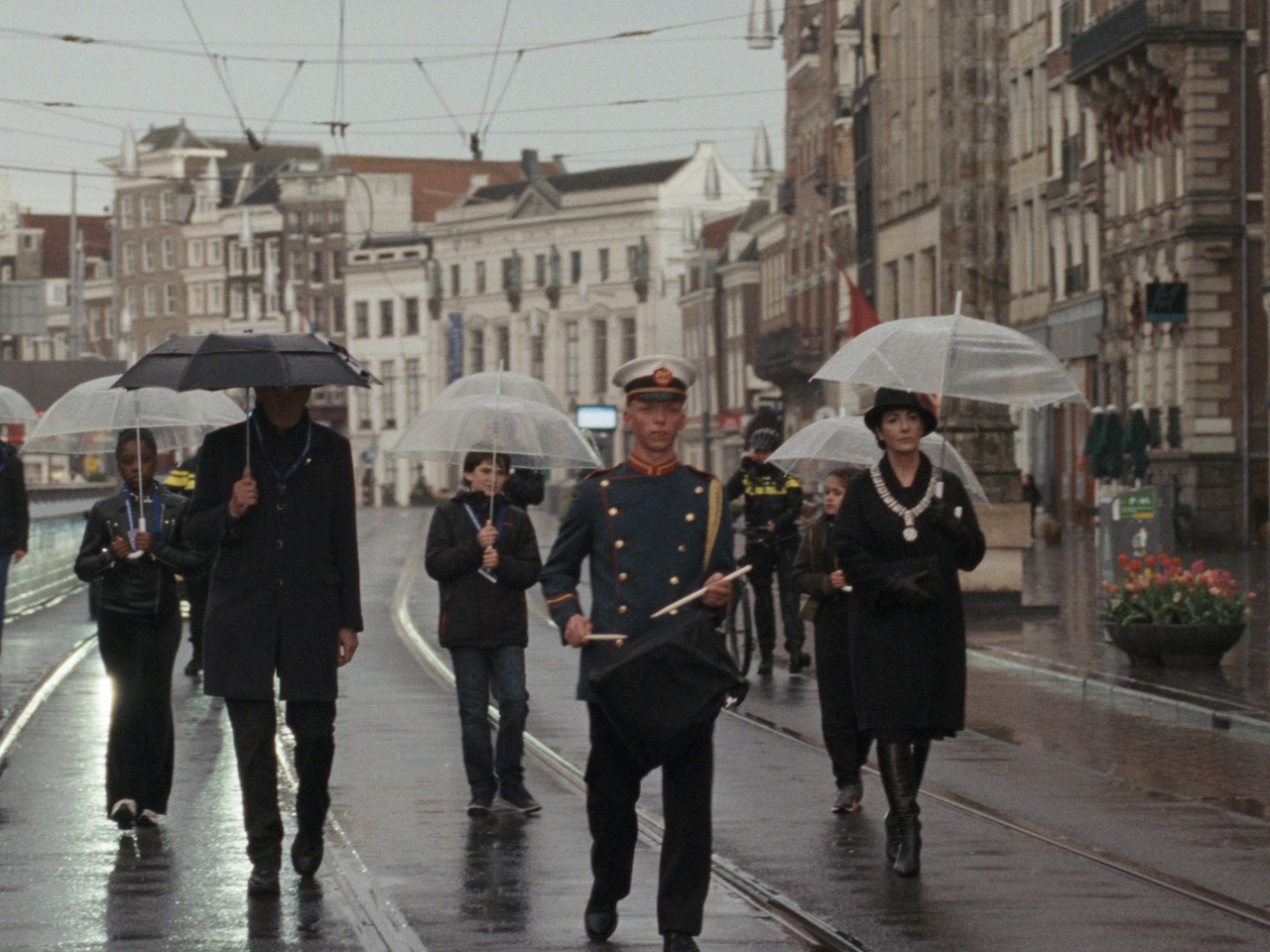In his four-hour documentary of Amsterdam under Nazi rule, Steve McQueen’s eye is more a poet’s than a philosopher’s
Memory has been preoccupying Steve McQueen of late. Most of the filmmaker’s work has been set in the past or has explored specific historical events, but the last couple of years have seen him experiment, in several distinct and fascinating ways, with the act of remembering itself. In Sunshine State, a two-screen installation first exhibited at Milan’s Pirelli Hangar Bicocca in 2022, McQueen narrated the story of his father’s narrow escape from murderous racists in Florida during the 1970s, over manipulated footage from 1927’s The Jazz Singer and shots of the active surface of the sun – a half-hour film that played on a loop but with subtle changes to his word choices and delivery each time, gesturing at the instability of secondhand memory. Grenfell (2023), also around 30 minutes long, saw the director’s airborne camera orbit the blackened husk of the titular council block, in which 72 people died in a catastrophic fire in 2017. A lapel-grabbing piece of filmmaking that played like a rhetorical question to British politicians (despite being entirely wordless), it was also an act of commemoration: viewers leaving the auditorium at London’s Serpentine Gallery (where the film was first presented) exited into a room with the names of the victims inscribed on the wall.
Occupied City combines elements of both works – Sunshine State’s disjuncture between soundtrack and image, and Grenfell’s insistence on remembering victims by name – but to less obvious effect. The movie comprises four hours of footage of contemporary Amsterdam accompanied by narrator Melanie Hyams dryly detailing tales of the city and the individuals who lived in it under Nazi occupation – stories that generally end in murder. McQueen clearly intends for us to draw parallels between the two time-periods, especially in terms of state power and how citizens respond to it; to make this easier he sets granular specifics from the past against a generalised present: the shots of Amsterdam are presented without context (though they generally correspond to the places being mentioned in the voiceover), while the narration never deviates from cataloguing the personalised horrors endured during the Occupation, mostly by the city’s Jewish residents. Like the year’s other major Holocaust film – Jonathan Glazer’s The Zone of Interest, which presents the uncanny spectacle of a Nazi family living next to Auschwitz, going about their lives and ignoring the screams and gunshots that are piercing the air around them – it sets up incongruities between what we’re seeing and what we’re hearing, then demands that we use both senses to actively construe meaning.

But where Glazer’s film appears tightly controlled, the presentation of information in Occupied City seems at once impartial – the movie’s sheer length implies countless individual stories, rather than an edited selection – and arbitrary. The visuals leapfrog around the city in apparent random order, the narration jumps backwards and forwards in time, and the sites being spoken of don’t always match the places we’re seeing onscreen. It’s up to us to join the dots.
The film’s method is clear from the first scene: footage of someone’s home in Amsterdam, in which a woman goes up and down the stairs to her cellar, is accompanied by Hyams relating how one young Jewish fugitive hid for days on top of a lift, presumably at the same address. This kind of half-rhyme between the narration and the quotidian activity happening onscreen puts a productive twist on Hannah Arendt’s oft-cited phrase ‘the banality of evil’: here, it’s not so much that evil itself is taking a banal form, but that evil exists amid banal surroundings – surroundings that could easily be our own.

This lack of handholding primes us to seek comparisons between our own turbulent era and 1940s Amsterdam – and indeed, some discomfiting parallels are implied, particularly in terms of state power. Even to a viewer accustomed to reports of law-enforcement violence, it’s a shock to watch covid-era scenes of police on horseback dispersing peaceful protesters by threatening, “You are urged to leave the premises… or violence will be used”. Even some of the more benign phenomena that arose out of 2020 pandemic restrictions find antecedents in occupied Amsterdam: the closure of one of the central parks in the 1940s, for instance, led to the oriole and the cuckoo making a reappearance in the city’s ecosystem, while the blackouts and curfews led to a huge spike in general interest in astronomy, the stars being more visible than ever under Occupation.
Such grace notes suggest McQueen’s eye is more a poet’s than a philosopher’s: after all, beyond the observation that reduced human activity causes pollution to drop and nature to thrive, how useful is it to compare pandemic lockdowns with the brutalising restrictions of a Nazi occupation? Several stretches of the narration, particularly in the second half, have to do with resistance to the Nazis; onscreen we variously see Extinction Rebellion demonstrators, antifascist protesters and antilockdown crowds. Under his own self-imposed rubric of impartiality, from behind a camera that appears to document everything, McQueen recuses himself not only from passing judgement on these causes or comparing their legitimacy, but from exploring how, or whether, they relate to each other – let alone to 1940s resistance movements in Western Europe, which, unlike today’s, were conducted at risk of death.
The director courts further charges of glibness with some of his editorial choices, several of which involve animal clips. As we hear about German officers disappearing after setting fire to workers’ barracks, we watch a duck vanishing into the water. We hear about a pregnant Jewish woman in hiding; we watch an apparently pregnant cat walking about. We hear about how 50 hungry people broke into a bakery and desperately stole hundreds of loaves; onscreen, pigeons peck mindlessly at a piece of bread.

If such shots risk taking the film into John Wilson territory, McQueen flexes his filmmaking muscle shortly after the one-hour mark: accompanied by a wash of Oliver Coates’s haunting score, the camera begins slowly cartwheeling through the empty nighttime streets of central Amsterdam. It’s a purely sensory interlude that, over nearly five minutes, imparts a genuine feeling of weightlessness, breaking free of the affectless capture of street scenes and the strictures of listing the barbarities of Occupation.
An abstract scene similarly devoid of incident or characters serves as an overture to The Zone of Interest: several minutes of discordant, unnerving sound design with no accompanying visuals appear to be Glazer’s way of acknowledging the presence of unspeakable horrors, before he deliberately leaves them offscreen. But the nocturnal interlude in Occupied City is harder to make sense of. It’s McQueen’s most active intervention in the material, yet it seems to come out of nowhere and has no clear relation to subsequent scenes. Unlike the film’s baked-in intermission, it doesn’t function as a carved-out space for reflection: it’s too engrossing, too sensual.
But it does find an echo in a more contemplative segment near the end, in which the camera sits for several minutes in an empty tram that glides through the city and ends up going through an industrial wash. This, in its quiet, unassuming way, is disturbingly equivocal imagery – a reminder, after all we’ve heard, that cleansing can take many forms: moral, spiritual, ethnic. It’s in these moments of restraint, and not when McQueen is shooting the citizens of Amsterdam like they’re in a formicarium, that the film truly begins to haunt.
